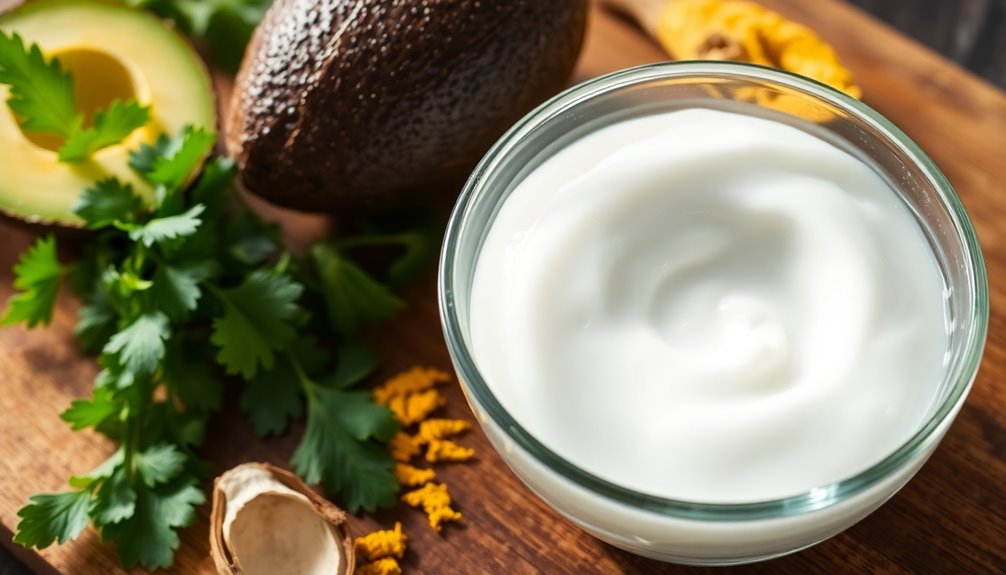You can easily replace butter with coconut oil in your recipes for a healthier alternative. Coconut oil has medium-chain triglycerides (MCTs) that provide quick energy, making it a great option for cooking and baking. It keeps its stability when heated, adds a distinct tropical flavor, and works well in a 1:1 ratio for most dishes. However, remember that coconut oil lacks omega-3 fatty acids found in other fats. Whether you choose refined for a neutral taste or unrefined for a stronger coconut flavor, there's plenty to experiment with to enhance your meals further. You'll discover more benefits and tips ahead.
Key Takeaways
- Substitute coconut oil in a 1:1 ratio for butter in most recipes to maintain consistency.
- Choose refined coconut oil for a neutral flavor or unrefined for a distinct coconut taste.
- Coconut oil is solid at room temperature, making it easy to measure and mix into recipes.
- It works well in recipes that bake at lower temperatures to prevent burning.
- Enjoy the health benefits of coconut oil, including MCTs for energy and improved skin hydration.
Benefits of Coconut Oil
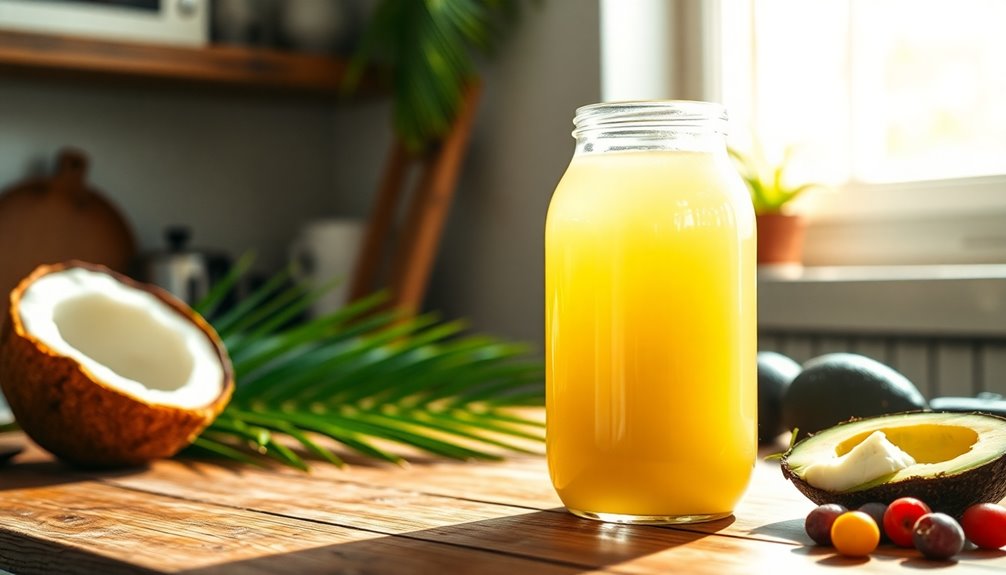
Coconut oil offers numerous health benefits that can enhance your cooking and overall well-being. When you incorporate this versatile oil into your routine, you'll discover its remarkable effects on both your skin and hair.
For skin benefits, coconut oil acts as a natural moisturizer. Its fatty acids help to hydrate and nourish your skin, making it feel soft and supple. Studies have shown that it can improve skin barrier function, which is essential for maintaining moisture levels and protecting against environmental damage. Plus, its antibacterial properties can help combat acne, giving you clearer skin.
When it comes to hair benefits, coconut oil shines again. It's rich in lauric acid, which penetrates the hair shaft, reducing protein loss and preventing damage. Applying coconut oil as a pre-wash treatment can help strengthen your hair, making it less prone to breakage. Additionally, it can tame frizz and add a healthy shine, contributing to a more polished look.
Whether you're using it for cooking or as a beauty staple, coconut oil can seamlessly fit into your lifestyle. It's not just about replacing butter; it's about embracing a healthier alternative that supports your well-being. Both your skin and hair will thank you for choosing this natural, nourishing option. So, why not give coconut oil a try? You'll likely find that it's a simple yet effective way to elevate your personal care routine.
Cooking With Coconut Oil
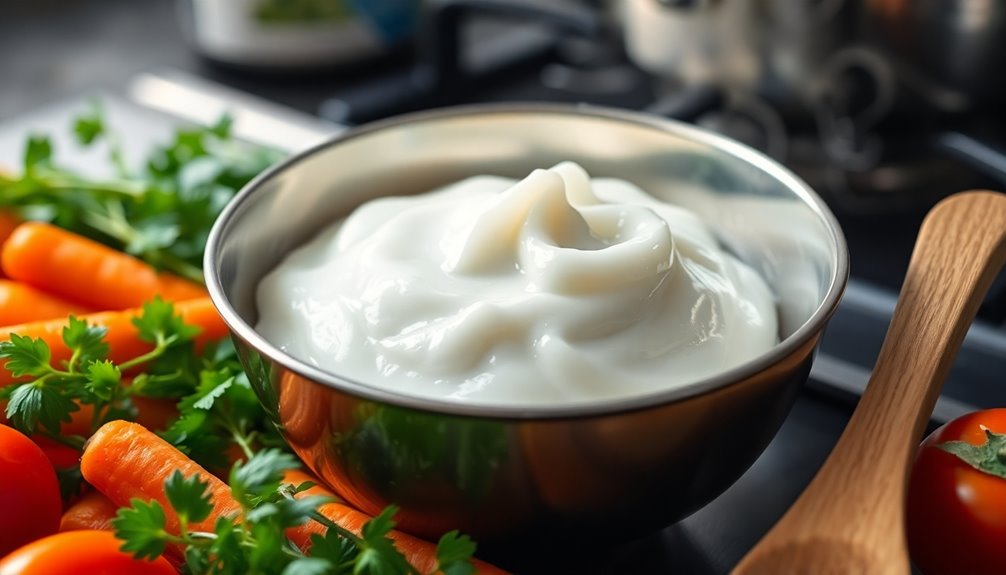
Using coconut oil in your cooking can be a delicious way to boost your health. This versatile oil not only adds a subtle, tropical flavor to your meals but also serves as a healthier alternative to traditional cooking fats like butter.
When you heat coconut oil, it maintains its stability, making it an excellent choice for sautéing and frying without compromising its nutritional properties.
When you incorporate coconut oil into your recipes, you'll find it enhances the taste of flavorful dishes, from stir-fries to roasted vegetables. It can even be used in salad dressings, lending a creamy texture that elevates your greens.
Plus, coconut oil is rich in medium-chain triglycerides (MCTs), which are known to provide quick energy and may support weight management.
It's important to note that while coconut oil offers benefits, moderation is key. Balancing your diet with a variety of healthy fats, including olive oil and avocado oil, can help you achieve [IDEAL] health.
Experimenting with coconut oil can also bring a sense of community to your cooking. Share your culinary creations with friends and family, and invite them to join you on this journey toward healthier eating.
Baking With Coconut Oil
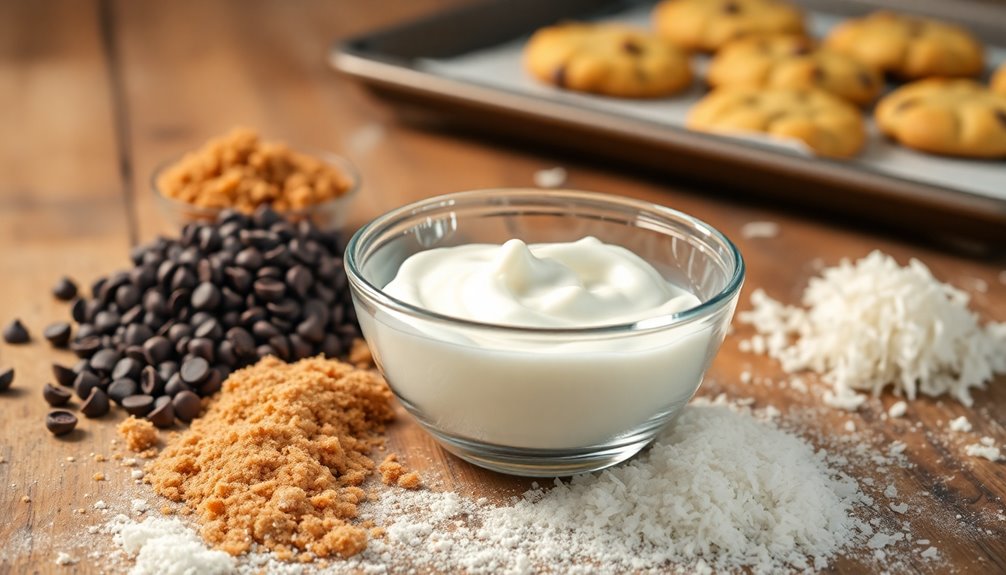
Baking with coconut oil can transform your preferred recipes while adding a distinct flavor and health benefits. When you swap coconut oil for butter, you'll notice a luxurious, slightly sweet taste profile that can elevate cookies, cakes, and muffins. It's a fantastic way to introduce a tropical flair to your baked goods, creating a welcoming ambiance for family and friends.
However, you might also experience some texture variances. Coconut oil is solid at room temperature but melts easily when heated. This means your baked goods may end up a bit denser or more similar to cake compared to those made with butter. If you desire a lighter texture, consider using refined coconut oil, as it has a more neutral taste and can help preserve the traditional lightness in your baked treats.
To secure the best outcomes, try experimenting with various recipes. Begin with one or two that typically call for butter and observe how they adjust to coconut oil. Keep in mind, you can usually use a 1:1 ratio when substituting, but tweaking the baking time may be necessary due to the oil's unique characteristics.
As you bake with coconut oil, you'll not only relish the delightful flavors but also feel good knowing you're making a healthier choice for yourself and your loved ones. So go ahead, embrace this versatile ingredient, and let your imagination shine in the kitchen!
Nutritional Comparison
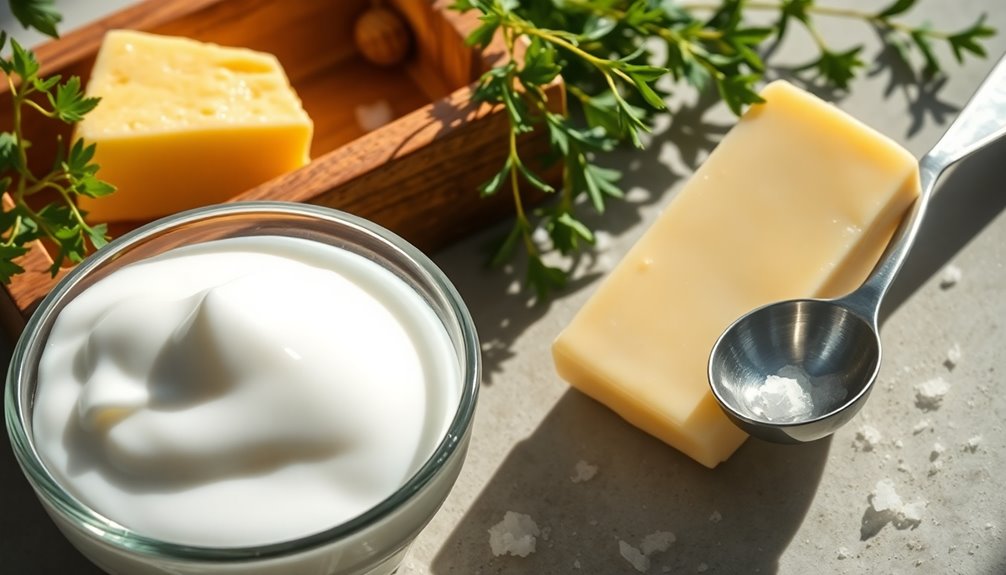
When comparing the nutritional profiles of coconut oil and butter, it's crucial to note that each brings its own set of benefits and drawbacks to the table. Both are high in saturated fats, but the types differ. Coconut oil consists primarily of medium-chain triglycerides (MCTs), which may offer quicker energy and have been linked to potential weight loss benefits.
On the other hand, butter contains longer-chain saturated fats, which can be more stable for cooking but may raise cholesterol levels in some individuals.
Coconut oil doesn't contain omega-3 fatty acids, which are vital for heart and brain health. In contrast, butter can also be low in omega-3s unless sourced from grass-fed cows, which can enhance its nutrient profile. This distinction emphasizes the significance of considering where your fats are coming from.
Furthermore, both fats contain calories—about 120 calories per tablespoon—but coconut oil's unique composition may make it more desirable for certain diets, like keto or paleo, where rapid energy sources are advantageous. It's crucial to remember that while both can be part of a balanced diet, moderation is key.
Ultimately, your choice between coconut oil and butter should align with your dietary needs and health goals. By understanding these nutritional differences, you can make informed choices that fit your lifestyle while enjoying the flavors you love. So, whether you stick with butter or embrace coconut oil, finding what works for you is what truly matters.
Tips for Easy Substitution
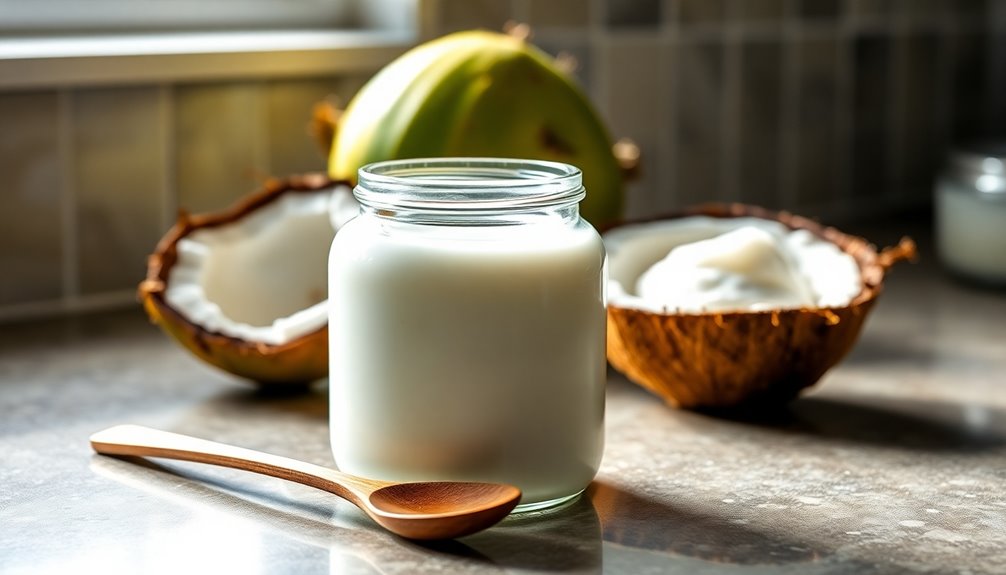
Substituting coconut oil for butter in your cooking and baking can be a straightforward process, especially with a few simple tips in mind. First, consider the type of coconut oil you're using. Refined coconut oil has a neutral flavor, making it great for recipes where you don't want a coconut taste. On the other hand, unrefined coconut oil adds a subtle coconut flavor that can enhance the overall taste of your dish, contributing to flavor enhancement.
When you're ready to substitute, use a 1:1 ratio for most recipes. That means if a recipe calls for 1 cup of butter, you can easily replace it with 1 cup of coconut oil. This substitution not only maintains the recipe's intended taste but also often results in texture improvement, giving your baked goods a richer, moister consistency.
Keep in mind that coconut oil is solid at room temperature, so if your recipe requires softened or melted butter, you can either melt the coconut oil before measuring or allow it to soften slightly. If you're baking, consider the temperature; coconut oil performs best in recipes that bake at lower temperatures, so adjust accordingly.
Lastly, don't be afraid to experiment! Start by substituting coconut oil in your favorite recipes and note any changes in flavor or texture. You might discover that coconut oil becomes a beloved staple in your kitchen. Enjoy the journey of cooking and baking with this versatile ingredient!
Frequently Asked Questions
Can Coconut Oil Be Used in Vegan Recipes?
Absolutely, you can use coconut oil in vegan recipes! It's a fantastic baking alternative that adds moisture and richness. When you substitute it for butter, you'll notice a unique flavor profile that can enhance your dishes.
Just remember, coconut oil solidifies at cooler temperatures, so adjust your measurements accordingly. Whether you're making cookies or cakes, its versatility makes it a popular choice in vegan baking, ensuring you don't miss out on deliciousness.
Is Coconut Oil Suitable for Those With Nut Allergies?
Coconut oil might as well be a superhero for those with nut allergies!
It's generally safe, as coconut isn't a true nut. However, you should always check for allergic reactions, especially if you're sensitive to similar foods.
Cross-contamination can occur during processing, so opt for brands that guarantee nut-free processing.
Always consult your healthcare provider before making changes to your diet to make sure it's safe for your specific situation.
What Is the Shelf Life of Coconut Oil?
Coconut oil generally has a shelf life of about 2 to 3 years when stored properly.
For best freshness, keep it in a cool, dark place, away from heat sources.
In cooking applications, it's versatile and can enhance flavors in various dishes.
If you notice any off-smells or discoloration, it's advisable to discard it.
Following these storage tips can help you enjoy coconut oil's benefits for a longer time while cooking.
Does Coconut Oil Have a Strong Taste?
Coconut oil's flavor can vary, but it typically has a mild, slightly sweet taste.
Surprisingly, in 2021, 70% of home cooks reported enjoying its unique flavor balance in various cooking applications.
While it mightn't overpower dishes, it can enhance flavors in baking or sautéing.
Can I Use Coconut Oil in Cold Dishes?
Yes, you can definitely use coconut oil in cold dishes! Its versatility makes it suitable for various cooking applications, like salad dressings or as a topping for baked goods. While it solidifies at cooler temperatures, it still blends well with other ingredients.
Plus, coconut oil offers health benefits, including healthy fats that can boost your energy. Just remember to choose refined coconut oil for a milder taste if you're concerned about flavor!
Conclusion
Incorporating coconut oil as a substitute for butter can elevate your cooking and baking while offering unique health benefits. While some might worry about its saturated fat content, research suggests that the medium-chain triglycerides in coconut oil can boost metabolism and support heart health when consumed in moderation. So, don't hesitate to explore this versatile ingredient; you'll not only enhance the flavor of your dishes but also enjoy a nutritious alternative that aligns with a balanced diet.

